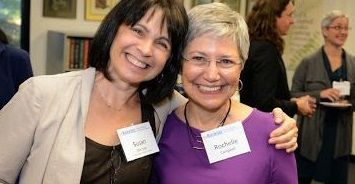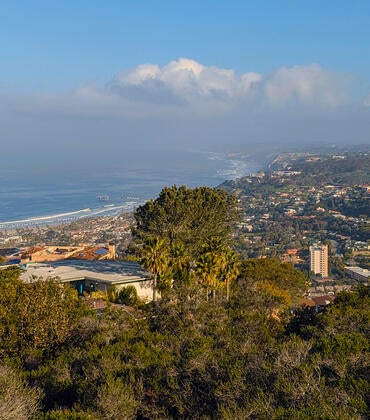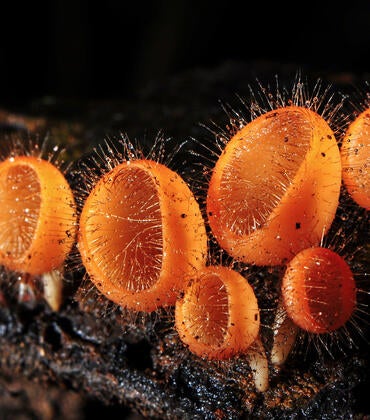
A $1 million gift from longtime campus supporter Rochelle Campbell and Distinguished Professor of Genetics and Campbell Presidential Chair holder Susan Wessler will provide financial support for undergraduate students engaged in summer research – an opportunity out of reach to many students due to financial barriers.
The newly established Campbell-Wessler Endowed Undergraduate Research Award will provide $5,000 awards to undergraduate researchers affiliated with the Neil A. Campbell Science Learning Laboratory and the Dynamic Genome Program within the College of Natural and Agricultural Sciences, or CNAS.
The Campbell Lab is led by Wessler, an internationally renowned researcher who conducts groundbreaking research on genome evolution. Wessler’s passion for cultivating the next generation of scientists led her to launch the Dynamic Genome, which provides freshmen with the caliber of experimental research typically reserved for graduate students.
“Like many of our students, I was first in my family to attend college, but I was also fortunate that my family was able to financially support me,” Wessler said. “Today, we live in a more competitive environment where college is far more expensive and potential graduate STEM students are expected to have had summer research experience during their undergraduate years. It is my hope that this donation will make it possible for students to pursue their passion for research by providing them with a stipend that helps reduce financial barriers otherwise keeping them from this opportunity.”
Rochelle Campbell has been a strong supporter of undergraduate research and Wessler’s teaching mission. In 2011, Campbell funded the creation of the Neil A. Campbell Science Learning Laboratory, and later established the Neil and Rochelle Campbell Presidential Chair for Innovation in Science Education in 2016.
“This gift gives undergraduates an incredible opportunity to work with leading research professors at UC Riverside,” said CNAS Dean Kathryn Uhrich. “The gift also bolsters our efforts to provide students, many of whom are the first in their family to attend college, unparalleled, hands-on learning experiences to launch their careers in science.”
Campbell’s and Wessler’s gift reinforces the value of early exposure to research. Such exposure allows undergraduate students to — among other things —better understand the importance of data literacy and published works and to learn a balance between collaborative and individual work. Undergraduate research also provides one-on-one mentorship with accomplished practitioners, which can catalyze careers. At UCR, undergraduates can work on original research not only in STEM fields, but also in the humanities, arts, and social sciences.
“Undergraduate research plays a critical role in the transition of students to scholars and professionals in their field,” said Provost and Executive Vice Chancellor Cynthia Larive. “About half of UCR’s undergraduate students report engaging in faculty–mentored research upon graduation. It is through sustained research opportunities, such as those funded by this generous gift, that students apply the material learned in their course work and develop skills in critical thinking, problem solving, communication and team work.”
Rochelle Campbell, who serves on the UCR Foundation Board of Trustees, retired from the San Bernardino Unified School District after working for 30 years as an adult counselor.
Neil Campbell, who passed away in 2004, was a 1975 UCR Ph.D. graduate, named in 2001 a “Distinguished Alumnus,” the highest award given by the UCR Alumni Association, for being an exceptional educator and supporter of science education. He is a co-author of “Biology,” known as the most widely read introductory English-language biology textbook in the world.
“Neil was committed to undergraduate science education. This was demonstrated through his years of teaching and his textbook ‘Biology’,” said Rochelle Campbell. “He understood that the innovative and productive researchers of tomorrow are enrolled in a freshmen biology lab today. It is the goal of this endowment to enrich the science experience of our undergraduates.”
Wessler is a global leader in the study of mobile DNAs, called transposons or transposable elements, that are a major driver of plant genome evolution. She worked in various capacities at the University of Georgia—including as director of the Center for Plant Cellular and Molecular Biology and University of Georgia Foundation Chair in Biological Sciences—until she joined the faculty of UCR in 2010.
Among distinctions she has received, Wessler is a member of the National Academy of Sciences and the first woman elected to the post of Home Secretary, a fellow of the American Academy of Arts and Sciences, and a Howard Hughes Medical Institute Professor. In 2014, she was awarded the McClintock Prize for Plant Genetics and Genome Studies. In 2017, she was named a foreign member of the Royal Society, the leading science academy of the United Kingdom, whose past members include Isaac Newton, Charles Darwin, and Albert Einstein.
Wessler graduated with a bachelor’s degree in biology from Stony Brook University, of the State University of New York, in 1974 and earned her doctoral degree from Cornell University in 1980.




